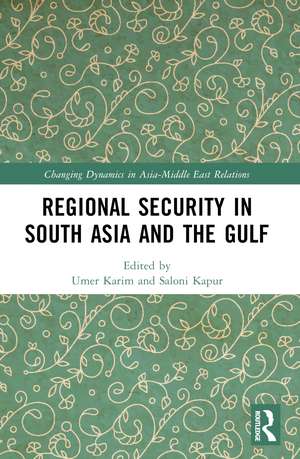Regional Security in South Asia and the Gulf: Changing Dynamics in Asia-Middle East Relations
Editat de Umer Karim, Saloni Kapuren Limba Engleză Paperback – 26 aug 2024
| Toate formatele și edițiile | Preț | Express |
|---|---|---|
| Paperback (1) | 310.95 lei 3-5 săpt. | +20.92 lei 6-12 zile |
| Taylor & Francis – 26 aug 2024 | 310.95 lei 3-5 săpt. | +20.92 lei 6-12 zile |
| Hardback (1) | 880.35 lei 6-8 săpt. | |
| Taylor & Francis – 24 feb 2023 | 880.35 lei 6-8 săpt. |
Preț: 310.95 lei
Nou
Puncte Express: 466
Preț estimativ în valută:
59.54€ • 61.100$ • 49.40£
59.54€ • 61.100$ • 49.40£
Carte disponibilă
Livrare economică 24 ianuarie-07 februarie
Livrare express 09-15 ianuarie pentru 30.91 lei
Preluare comenzi: 021 569.72.76
Specificații
ISBN-13: 9781032254180
ISBN-10: 1032254181
Pagini: 222
Dimensiuni: 156 x 234 x 19 mm
Greutate: 0.41 kg
Ediția:1
Editura: Taylor & Francis
Colecția Routledge
Seria Changing Dynamics in Asia-Middle East Relations
Locul publicării:Oxford, United Kingdom
ISBN-10: 1032254181
Pagini: 222
Dimensiuni: 156 x 234 x 19 mm
Greutate: 0.41 kg
Ediția:1
Editura: Taylor & Francis
Colecția Routledge
Seria Changing Dynamics in Asia-Middle East Relations
Locul publicării:Oxford, United Kingdom
Public țintă
Academic, Postgraduate, and Undergraduate AdvancedNotă biografică
Umer Karim is a doctoral researcher in the Department of Political Science and International Studies at the University of Birmingham. His academic research focuses on Saudi foreign policy and broader geopolitics of the Middle East. Karim also works on Pakistan's foreign policy outlook and its engagement with the Middle East. He is an Associate Fellow at the King Faisal Center for Research and Islamic Studies and a Fellow of the SEPAD Project at Lancaster University's Richardson Institute.
Saloni Kapur is Assistant Professor of International Studies in the Department of Social Sciences at FLAME University. Her research interests include critical security studies, decoloniality, and South and West Asia. Saloni holds a PhD in International Relations from Lancaster University. She is the author of Pakistan after Trump: Great Power Responsibility in a Multi-Polar World (2021) and the co-editor of Securitisation in the Non-West (Routledge, 2019).
Saloni Kapur is Assistant Professor of International Studies in the Department of Social Sciences at FLAME University. Her research interests include critical security studies, decoloniality, and South and West Asia. Saloni holds a PhD in International Relations from Lancaster University. She is the author of Pakistan after Trump: Great Power Responsibility in a Multi-Polar World (2021) and the co-editor of Securitisation in the Non-West (Routledge, 2019).
Cuprins
Introduction
Umer Karim and Saloni Kapur
Index
Umer Karim and Saloni Kapur
- India, the Persian Gulf, and the Emergence of a SupercomplexSaloni Kapur
- Pakistan and the GulfZahid Shahab Ahmed and Khurram Abbas
- The Estranged Partners: Iran’s Complicated Relations with India and PakistanMohammad Soltaninejad
- Complex Interdependence and Security Architecture: Charting Bangladesh-Gulf Ties and Political EngagementsLailufar Yasmin
- Sri Lanka and the Gulf StatesShakthi De Silva and Robin Vochelet
- Oman’s Relations with Pakistan and IndiaMehmet Rakipoğlu and Gökhan Ereli
- Pakistan and Saudi Ties: An Overview of Political, Strategic, Economic and Defence LinkagesUmer Karim
- India and the United Arab Emirates: Upgrading the Strategic Partnership
Index
Descriere
As we move towards a world without superpowers, the dynamics within and between regions are of growing significance. Against this backdrop, this book explores the links between South Asia and the Gulf, which have existed for centuries but are undergoing important shifts in the transition to multipolarity.




